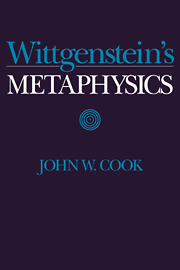Book contents
- Frontmatter
- Contents
- Preface
- List of Abbreviations
- Introduction
- Part I From Idealism to Pure Realism
- Part II The Metaphysics of Wittgenstein's Later Philosophy
- Part III Causation and Science in a Phenomenal World
- Part IV Logical Possibilities and the Possibility of Knowledge
- Part V The Past, Memory, and The Private Language Argument
- Name Index
- Subject Index
- Frontmatter
- Contents
- Preface
- List of Abbreviations
- Introduction
- Part I From Idealism to Pure Realism
- Part II The Metaphysics of Wittgenstein's Later Philosophy
- Part III Causation and Science in a Phenomenal World
- Part IV Logical Possibilities and the Possibility of Knowledge
- Part V The Past, Memory, and The Private Language Argument
- Name Index
- Subject Index
Summary
It has been common to regard Wittgenstein as being, in his later years, an ordinary language philosopher in some fairly obvious sense of that phrase. The reason for this is that in his later writings he frequently admonished us to consider how words are actually used. And he declared that the philosopher's task “is to bring words back from their metaphysical to their everyday use” (PI, §116). All of us, I suppose, have noticed that Wittgenstein persisted in the metaphysical use of various words. But these failures have commonly been regarded as nothing more than isolated errors he would have been happy to correct. No one, I think, saw in these a pattern indicative of a pervasive metaphysical theory. And yet this, I will argue, is precisely what these seeming lapses actually were. Wittgenstein, if I am right, never rejected the empiricist metaphysics that forms the basis of the Tractatus. By 1916 he had embraced that version of empiricism that William James called “radical empiricism” and Bertrand Russell later called “neutral monism.” From that date until his death his fundamental views changed very little. In his later writings he did revise the Tractatus account of language, but beyond that he merely tinkered with empiricism, adjusting both it and ordinary language until he could bring them to a conformity that suited him.
- Type
- Chapter
- Information
- Wittgenstein's Metaphysics , pp. xv - xxivPublisher: Cambridge University PressPrint publication year: 1994
- 1
- Cited by



